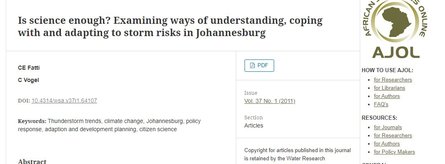
Planning for current and future climate risks depends on more than early warning signals and technical climate information. The management and enabling of effective risk approaches, we argue, is shaped by complex contextual settings. These contexts are shaped by decisions including: What climate risks are prioritised? Who makes decisions about risk response interventions and how do they make these decisions? This preliminary study uses observed changes in storm events in the City of Johannesburg (CoJ) and the City’s Climate Change Adaptation Plan as a lens through which the scope of such contexts and decisions can be interrogated. The study is used as a springboard from which to begin a dialogue on interactive approaches to adaptation and response planning for current and future climate change. We suggest that this dialogue may be required for a more proactive disaster-risk approach in the city. The major focus of the paper includes a statistical analysis of historical weather data from the OR Tambo Weather Station, located in close proximity to the city. Significant trends are identified in the frequency and intensity of thunderstorms for the period 1960-2009. This preliminary assessment shows some similarities with emerging climate change projections that suggest that heavy rainfall events may become more frequent and intense. The preliminary results presented here also concur with the recent findings contained in the CoJ’s Climate Change Adaptation Plan (2009). While the study is in no way substantive and few wider generalisations and strong conclusions can be drawn from it, the study does provide a useful starting point for considering possible planning interventions. The potential value of using science and information from studies, such as this, is highlighted along with the possible ways in which such science can interact with and help inform a comprehensive planning agenda in the City. Finally, the paper calls for more attention to be paid to the contributions and perceptions of community awareness and understanding of climate risks.